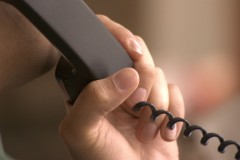Four separate phone scams targeting local residents are making their way through the Shore area, officials with the Monmouth County Prosecutor’s Office said Friday.
The first is an IRS scam, which involves a caller posing as an Internal Revenue Service agent claiming that back taxes are owed. If a local resident is concerned that they may owe the IRS back taxes, they should never provide any information to anyone over the phone, authorities said. First, call the IRS directly at 1-800-829-1040 to ask about your current tax status. The IRS will send you a letter in the mail, if you owe back taxes.
“They never make cold calls, and certainly never demand cash or threaten immediate police actions,” said Acting Prosecutor Christopher J. Gramiccioni, in a statement.
|
|
The second scam involves credit cards.
According to the prosecutor’s office:
Credit card companies will never call you to ask you to verify your Card Security Code or Card Verification Value (CVV) numbers on the back of your credit card. Be alert, because this is one key aspect of a Visa fraud that is picking up steam nationwide. The tricky part of this scam is that the caller will have a great deal of your personal information, making them seem like a legitimate representative of your credit card company. They will indicate that their fraud department has noticed unusual purchases on your account and will ask you to verify some of your information. They will have your address and will even provide you with a case or control number for their research into the alleged misuse of your credit card. Never provide the CVV numbers from the back of your credit card in response to such a call. Instead, tell the caller that you will call the credit card company directly for verification of the conversation – and then follow through and call the fraud department of your credit card issuer. Your credit card company does not need to ask you for information that they are already in possession of – like the security code on the back of your credit card.
The third scam targets people by convincing them a family member is in need of help. The elderly often fall victim to this scam where a call comes in, purportedly from a grandchild far from home, and in a jam requiring financial assistance, said Gramiccioni.
“These unexpected phone calls always come unannounced,” Gramiccioni explained. “The voice on the other end of the phone claims to be a grandchild in a very low tone, there is concern in their voice as they inform you they are on some vacation you never heard about and that they somehow got arrested and are sitting in some jail in a foreign country. They need your help. They need bail money. They ask you not to say anything to anyone because they are embarrassed. Hang up and call a family member to try to verify the whereabouts of your grandchild. Do not provide a credit card number over the phone in response to such a call.”
Finally, another scam involves a caller posing as a JCP&L representative. In the “power or utility company scam,” people receive a phone call threatening that power or water service at a residence or business will be shut down unless direct payment is made using a pre-paid debit card, such as a Green Dot card. The con artists sound very convincing and may even know a lot about you or your business, Gramiccioni said. The call can look legitimate as well with the Caller ID being spoofed to indicate it is coming from a JCP&L phone number – even when it is not.
“If you receive such a call, hang up and call JCP&L directly to check on the status of your account,” said Gramiccioni.
Anyone who may have been a victim of any scam is asked to contact their local police department or the county prosecutor’s office.

Advertisement

Police, Fire & Courts
Teacher From Brick, 36, Charged With Carrying on Affair With Student
Brick Life
Adult Autism Transition

Police, Fire & Courts
Teacher From Brick Charged in Another Sex Affair With Student









